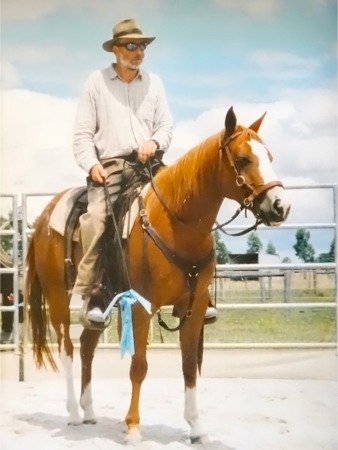Every horse sits on the scale between being emotionally sensitive and emotionally stoic.
Before I go any further I want to state that for the purposes of this essay, stoicism is not the same as dullness. Stoicism is the ability to bear hardship or stress, but dullness is a lack of care about hardship or stress. I believe that for the most part horses are born with a level of stoicism, but dullness is largely taught. Maybe this is a point of argument but let’s leave that discussion for another time.
The difference between a sensitive and a stoic horse is their sensitivity to emotional stress. It’s how they deal with trouble. The more sensitive a horse is the more anxiety they carry and the more desperate they are to resolve the trouble. This means sensitive horses tend to react badly to small degrees of trouble and may even be prone to panic when a butterfly in the jungles of Borneo farts.
Stoic horses can be just the opposite. It can take quite a lot of trouble for some stoic horses to get upset. Of course, all horses exist somewhere between being super stoic and super sensitive.
Now to the point of this article.
Our job as horse owners is to meet the emotional needs of each of our horses - the sensitive ones and the stoic ones.
A horse views the world in terms of safety and comfort. They are among the animal kingdoms' most avid avoiders of discomfort. Their sense of self-preservation depends on it.
With that concept in mind, the bond we form with our horses is largely dependent on how well we meet their emotional needs. The more our horses see us as the solution to their emotional worries, and not the cause, the stronger the bond we form with them. Of course, the opposite is also true in that if we ignore their emotional needs the more our relationship looks like a master/slave co-dependence.
Sensitive horses have a lot of emotional needs - more than stoic horses. If our horses look to us to solve those needs, they look to us as an important, welcomed, and necessary part of their life. Instead us our sessions together being viewed by our horses as an interruption to their day, they become a welcome relief because we offer a degree of emotional comfort. For this reason, if the training is good, a sensitive horse offers the most rewarding opportunity for a brilliant relationship.
I want to emphasize that I’m not saying that you can’t have an amazing relationship with a stoic horse. You can and they can be awesome. But appreciate that a stoic horse tends to carry less emotional baggage and they become less dependent on you to fix all their worries. They just lean towards being more emotionally independent which means it can be harder to form an emotional attachment for them. It also means they could be more resistance to change because their “care factor” is weaker. They may form a strong bond with people as treat-givers, but not necessarily as “trainers” who have things to teach them.
Of course, the opposite is also true. If the training is poor our ability to damage any relationship with a sensitive horse is massive. If we don’t address the sensitive horse’s emotional needs (or even add to them by our incompetence or lack of concern) we do more harm than good. Their life would be better if we left them to spend their days in the paddock. On the other hand, if we don’t meet the emotional concerns of the stoic horse we are going to do less damage than we would with a sensitive horse because of their strong coping mechanisms.
When looking to buy a horse most people assess a horse by what it has to offer them - looks, education, age, size, breed, experience, etc. Not everyone assesses a horse by what they have to offer it. When was the last time you saw a horse advertised with a description something like, “A terrific horse, but the owner was unable to meet its emotional needs”?
It should also be appreciated that you can’t separate a horse’s emotional comfort from their physical performance. To give its best, a horse needs to feel emotionally comfortable. If its focus is conflicted by emotional troubles, performance will inevitably suffer. Even a blue ribbon winner can’t give its best if it carries trouble inside.
This is Chops from a few years ago. She is the most sensitive horse I have ever been honoured to share my life with. And a champion in every sense of the word - even at 30.

